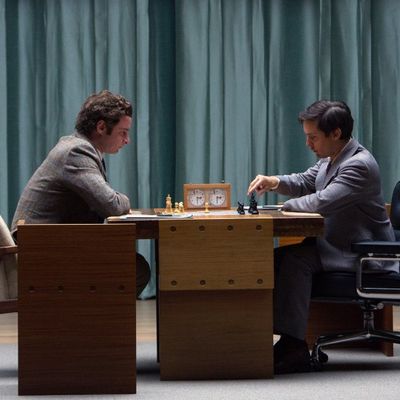
The Bobby Fischer biopic Pawn Sacrifice builds to the international psychodrama of the Fischer–Boris Spassky match in 1972 in Iceland. The joke — which isn’t portrayed as a joke but utterly straight — is that at a crucial point in the Cold War, when the U.S. was culturally and militarily devastated by the Vietnam debacle, the country’s propaganda hopes were pinned on a paranoid nutjob. With a paranoid nutjob in the White House, this could be depicted as strangely fitting, although political satire is not on director Ed Zwick’s mind. This is another moderately interesting but shallow biopic with an actor going for broke — to win, not to draw.
As Fischer, Tobey Maguire has an eagerness to please — to deliver the goods — that’s at odds with the young Fischer’s tunnel vision. In a key scene, Zwick digitally substitutes Maguire for the real Fischer in a ’71 interview with Dick Cavett, and the difference (you can watch the original on YouTube) is telling. Wide-shouldered, built like an athlete, slouched so that his long legs unbalance the space, Fischer answers in monosyllables and lets Cavett twist. He doesn’t trust or want to help Cavett; he cares only about protecting himself and winning the match. You study him for clues the way you don’t study Maguire, who in other scenes pops his eyes and telegraphs his rage and paranoia. It’s not a bad performance — in later life, Fischer himself seemed unnatural, like a bad ham — but it’s better in its lower keys. The big stuff calls too much attention to itself.
Zwick begins in Iceland and flashes back to moments in Fischer’s evolution, from his matches as a child to his rejection of his single mother (a Jewish girl with Bolshie friends, played by Robin Weigert) to his first meetings with the Grand Masters. The director is a pro and hits all his marks, but apart from some fancy, A Beautiful Mind–like computer effects in early matches, Zwick hasn’t figured out how to bring this complicated head game to life cinematically. We hear how amazing and unorthodox Fischer’s moves are without seeing why. Reams of material in print and online illuminate the nature of Fischer’s playing in a way the movie doesn’t. And as Maguire’s Fischer becomes more and more erratic, paranoid, and even delusional, it’s important to see in those games a higher lucidity. Without that, Bobby has little stature — he’s just a loon. Liz Garbus’s documentary Bobby Fischer Against the World is a lot more dramatic.
Liev Schreiber plays Spassky with a Grand Master actor’s cunning, as a man who shows his power through imperious self-containment — and becomes increasingly unhinged by an opponent whose personal moves he can’t predict. Otherwise, the cast — including Peter Sarsgaard as a chess-playing priest who becomes Bobby’s handler, and Michael Stuhlbarg, a reporter with ties to the U.S. government — barely registers. The suspense of Pawn Sacrifice is getting Fischer sane enough so that he can sit down across from his opponent and focus. We end up as impatient as those poor souls sitting in Reykjavík, looking at our watches.





